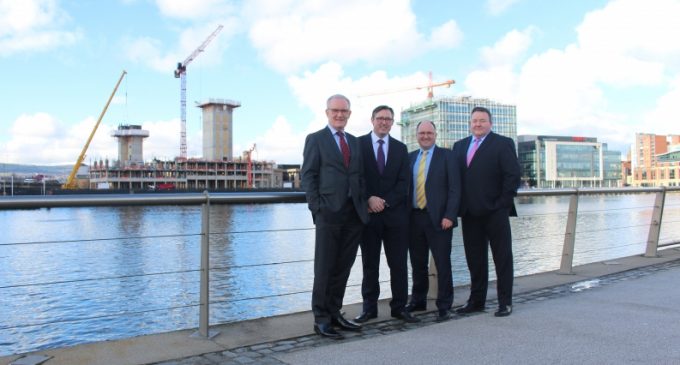CEF/BDO survey finds construction companies performing strongly – but with challenges on the horizon

The first Construction Employers Federation (CEF)/BDO Northern Ireland Half-Year State of Trade Survey has revealed the books were full or nearly full for two-thirds of local construction companies during the first six months of 2017.
The positive growth, seen most clearly in private housebuilding and infrastructure work, comes at a time of significant political and economic uncertainty – some of which is beginning to feed through into companies’ workloads and business planning.
Key survey findings:
- Construction sector saw sustained growth over the first 6 months of 2017
- Two-thirds of companies worked at full or almost full capacity in first 6 months of 2017
- Much of this growth is within private housing – taking it back to its highest level since 2011
- Companies are cautiously realistic with next 6-12 month period expected to see higher costs and squeezed margins
- That being said, the companies surveyed expect their workloads to be the same as now, if not greater
- Four challenges are though clearly emerging – the impact on workloads from the lack of a Northern Ireland Executive; the impact a potential hard Brexit could have on companies otherwise positive growth expectations; the significant skills shortage across many trades and; how substantial rises in labour, material and plant costs are impacting on margins and firms’ capacity to reinvest
The survey results are based on a sample of 60 CEF members that represent 50% of Northern Ireland’s construction output, weighted across its constituent parts – general contracting, civil engineering and housebuilding – and company turnover.
CEF Managing Director John Armstrong said: “The survey results reflect a local construction industry that is now well beyond its low point of 2012. Industry workloads are strong with the last 6-12 months having seen a substantial increase in new housing activity as well as encouraging growth in infrastructure work.
“The next 6-12 month period is absolutely critical for the local construction industry. The companies surveyed want to push on, they want to get beyond the stability phase that many have been in during recent years. The growth opportunities are there – the quarter on quarter increases in new housing starts and completions alone point to a housebuilding sector which is beginning to once again play a full role in unlocking economic growth and opportunity.”
Brian Murphy, Partner at BDO Northern Ireland said: “In a year of Brexit uncertainties and local political stalemate, the construction sector has remained for the most part buoyant. The half-year survey is characterised by cautious realism with most companies anticipating higher costs and squeezed margins.
“While the construction sector is battling higher input prices and limited public sector contracts, indicators point towards a quiet confidence and with good cause. Building work on new homes in the first quarter was up 16% year-on-year, major plans are underway for new office and retail space and there is the prospect of a £400million capital investment from the Tory-DUP deal over the next two years.
Brian Murphy said: “Realism, however, is not pessimism and the majority of firms expect to have the same or more work in 12 months’ time than they do currently. The optimists outnumber others by almost three to one on this front.
“There is no doubt that wider factors are having an impact. There is acknowledgement that labour, material and plant costs will rise and there is potential for a rise in interest rates, but the sector is beyond the point of merely surviving. Expectations are that order books will remain steady and workloads will be sustained in the main.
“Two-thirds of companies worked at full or almost full capacity in the first half of 2017 and many are prioritising growth. It’s vital that construction companies of all sizes have the right support to grow smartly and sustainably.”
John Armstrong said: “There are though four clear challenges that are emerging from the survey: industry’s concerns at a slowdown in public sector work resulting from the lack of a Northern Ireland Executive; the impact a potential hard Brexit could have on companies otherwise positive growth expectations; the significant skills shortage across many trades and; how substantial rises in labour, material and plant costs are impacting on margins and firms’ capacity to reinvest.
“The lack of a Northern Ireland Executive and the lack of a fully agreed Budget have undoubtedly impacted on the tendering opportunities available in recent months. That is simply unacceptable given that, in reality, there is a public sector capital budget there to be spent – and a budget that itself is growing year on year. Industry was also very supportive of the additional £400m of capital expenditure, over 2 years, announced as part of the Conservative-DUP deal. It has huge potential to create thousands of new jobs within the industry and develop key economic infrastructure that will enhance Northern Ireland’s competitiveness and attractiveness as a region to do business and invest in. It is therefore vital that we see those monies allocated soon to make sure they are spent to their maximum economic effect.
“We must also face head on the uncertainties of Brexit. Invisible trade barriers are already becoming evident within the construction industry as some companies question whether they should tender for work in the Republic of Ireland whose build programmes last beyond March 2019. We cannot and must not allow these issues to exacerbate over the coming months as these concerns could extend further into materials transportation and costs or reciprocal arrangements around qualifications. For that reason and others, we need to get our act together, we need a Northern Ireland Executive unitedly fighting the cause of the entire business community in the negotiations that have now commenced.”







